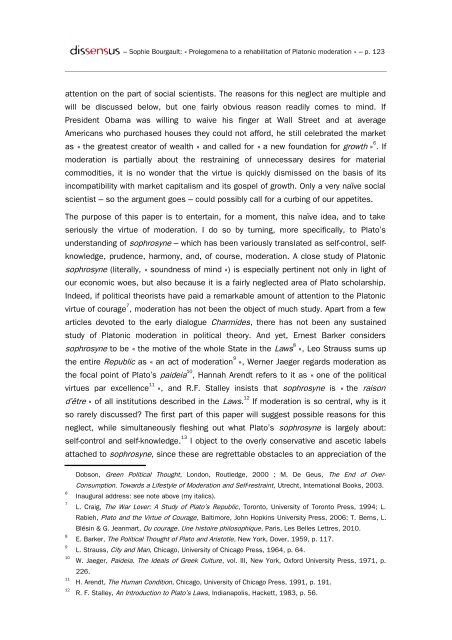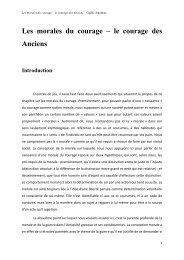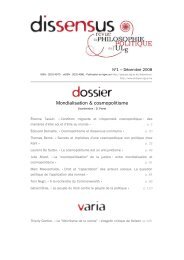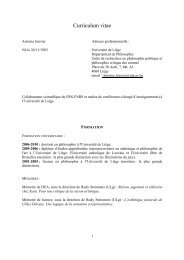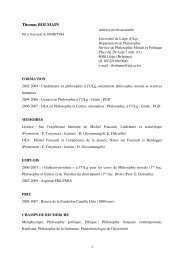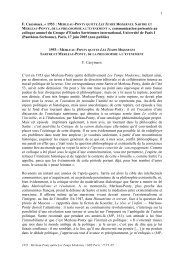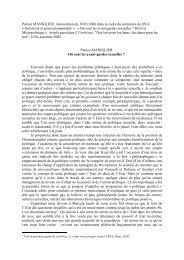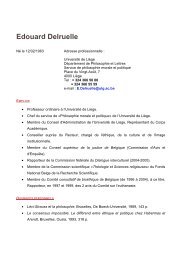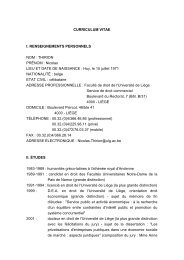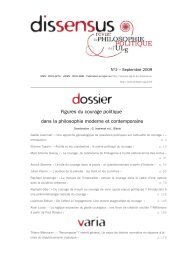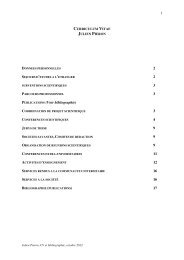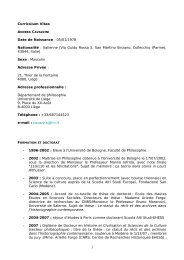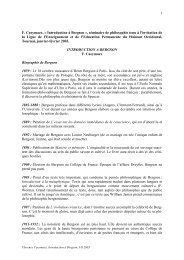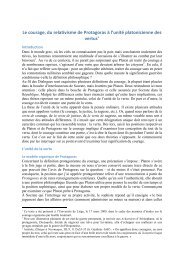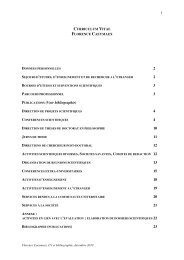Subjectivations politiques et économie des savoirs - Service de ...
Subjectivations politiques et économie des savoirs - Service de ...
Subjectivations politiques et économie des savoirs - Service de ...
You also want an ePaper? Increase the reach of your titles
YUMPU automatically turns print PDFs into web optimized ePapers that Google loves.
– Sophie Bourgault: « Prolegomena to a rehabilitation of Platonic mo<strong>de</strong>ration » – p. 123<br />
attention on the part of social scientists. The reasons for this neglect are multiple and<br />
will be discussed below, but one fairly obvious reason readily comes to mind. If<br />
Presi<strong>de</strong>nt Obama was willing to waive his finger at Wall Stre<strong>et</strong> and at average<br />
Americans who purchased houses they could not afford, he still celebrated the mark<strong>et</strong><br />
as « the greatest creator of wealth » and called for « a new foundation for growth » 6 . If<br />
mo<strong>de</strong>ration is partially about the restraining of unnecessary <strong><strong>de</strong>s</strong>ires for material<br />
commodities, it is no won<strong>de</strong>r that the virtue is quickly dismissed on the basis of its<br />
incompatibility with mark<strong>et</strong> capitalism and its gospel of growth. Only a very naïve social<br />
scientist – so the argument goes – could possibly call for a curbing of our app<strong>et</strong>ites.<br />
The purpose of this paper is to entertain, for a moment, this naïve i<strong>de</strong>a, and to take<br />
seriously the virtue of mo<strong>de</strong>ration. I do so by turning, more specifically, to Plato’s<br />
un<strong>de</strong>rstanding of sophrosyne – which has been variously translated as self-control, selfknowledge,<br />
pru<strong>de</strong>nce, harmony, and, of course, mo<strong>de</strong>ration. A close study of Platonic<br />
sophrosyne (literally, « soundness of mind ») is especially pertinent not only in light of<br />
our economic woes, but also because it is a fairly neglected area of Plato scholarship.<br />
In<strong>de</strong>ed, if political theorists have paid a remarkable amount of attention to the Platonic<br />
virtue of courage 7 , mo<strong>de</strong>ration has not been the object of much study. Apart from a few<br />
articles <strong>de</strong>voted to the early dialogue Charmi<strong><strong>de</strong>s</strong>, there has not been any sustained<br />
study of Platonic mo<strong>de</strong>ration in political theory. And y<strong>et</strong>, Ernest Barker consi<strong>de</strong>rs<br />
sophrosyne to be « the motive of the whole State in the Laws 8 », Leo Strauss sums up<br />
the entire Republic as « an act of mo<strong>de</strong>ration 9 », Werner Jaeger regards mo<strong>de</strong>ration as<br />
the focal point of Plato’s pai<strong>de</strong>ia 10 , Hannah Arendt refers to it as « one of the political<br />
virtues par excellence 11 », and R.F. Stalley insists that sophrosyne is « the raison<br />
d’être » of all institutions <strong><strong>de</strong>s</strong>cribed in the Laws. 12 If mo<strong>de</strong>ration is so central, why is it<br />
so rarely discussed? The first part of this paper will suggest possible reasons for this<br />
neglect, while simultaneously fleshing out what Plato’s sophrosyne is largely about:<br />
self-control and self-knowledge. 13 I object to the overly conservative and asc<strong>et</strong>ic labels<br />
attached to sophrosyne, since these are regr<strong>et</strong>table obstacles to an appreciation of the<br />
6<br />
7<br />
8<br />
9<br />
10<br />
11<br />
12<br />
Dobson, Green Political Thought, London, Routledge, 2000 ; M. De Geus, The End of Over-<br />
Consumption. Towards a Lifestyle of Mo<strong>de</strong>ration and Self-restraint, Utrecht, International Books, 2003.<br />
Inaugural address: see note above (my italics).<br />
L. Craig, The War Lover: A Study of Plato’s Republic, Toronto, University of Toronto Press, 1994; L.<br />
Rabieh, Plato and the Virtue of Courage, Baltimore, John Hopkins University Press, 2006; T. Berns, L.<br />
Blésin & G. Jeanmart, Du courage. Une histoire philosophique, Paris, Les Belles L<strong>et</strong>tres, 2010.<br />
E. Barker, The Political Thought of Plato and Aristotle, New York, Dover, 1959, p. 117.<br />
L. Strauss, City and Man, Chicago, University of Chicago Press, 1964, p. 64.<br />
W. Jaeger, Pai<strong>de</strong>ia. The I<strong>de</strong>als of Greek Culture, vol. III, New York, Oxford University Press, 1971, p.<br />
226.<br />
H. Arendt, The Human Condition, Chicago, University of Chicago Press, 1991, p. 191.<br />
R. F. Stalley, An Introduction to Plato’s Laws, Indianapolis, Hack<strong>et</strong>t, 1983, p. 56.


